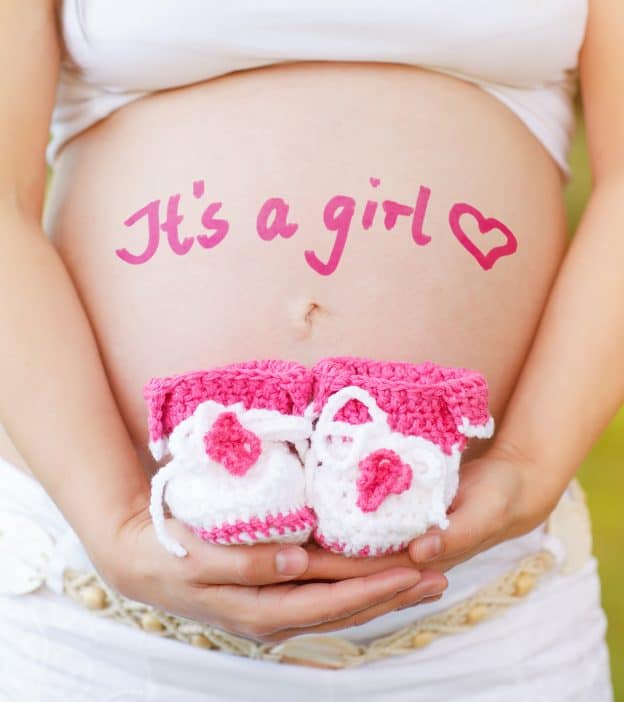
Table of Contents
Have you only recently tested positive for pregnancy and cannot wait for a couple of months before the doctors run a scan to accurately announce the baby’s gender? While these hints and tips for predicting a baby’s sex may be only for fun, here’s how to predict the sex of your baby!
During the term of your pregnancy, you will have tons of people making guesses about your pregnancy; not only about the gender of the baby on the basis of factors as peculiar as the shape of the bump, but some might even want to take guesses on how deep into your pregnancy you are. Though all this guessing and quizzing is fun for others, knowing if you are having a boy or girl would obviously be a rather nerve-wracking situation for you and your partner to be in.
You may also be wondering if there’s any non-invasive, prenatal testing solution; if there’s a way you could find out the sex of the baby even prior to the scan. You may have also already checked out the Ramzi method of determining a baby’s sex. While there are a few ways as mentioned in this blog below, it should always be kept in mind that the definitive way to find the gender of the baby is an ultrasound or a professionally conducted test. All these ways are only slightly more accurate but a little fun and guessing killed nobody!
Predicting Your Baby's Gender: Signs that you’re carrying a girl

1) Hyperemesis Gravidarum
While morning sickness is a common and in fact the most prominent symptom of pregnancy, some mothers have it worse. Not only their nausea is more prolonged and more severe but might also at times lead to weight loss, malnutrition, and serious dehydration. This form of severe nausea or morning sickness experienced only by some moms is known as Hyperemesis Gravidarum and – you may have guessed it already- is more likely to take place for women who are carrying a baby girl.
This is not just old wives’ tales! Studies have actually in the past suggested the correlation between severe morning sickness with a baby girl. As you may know, the levels of hCG in a woman’s body are the root cause of pregnancy symptoms and the fetuses of women with a baby girl produce more hCG than fetuses with a baby boy resulting in Hyperemesis Gravidarum.
2) Forgetfulness
Though there is no definite reasoning available for this, research and studies in the past have concluded that women who are carrying a baby girl tend to be more forgetful than women who are carrying a boy. Not only do women carrying a baby girl exhibit forgetfulness in everyday situations but as per the studies, they also tend to underperform in tests based on listening, computational, and visualization skills — in comparison to women carrying a boy.
3) Increased stress
Do you find yourself more stressed during your pregnancy than you have ever felt before? Or are you a second-time mom who feels more stressed in the second pregnancy as compared to your previous boy-bearing pregnancy? Well, well it is your baby girl in the womb to account for. Moms with a baby girl tend to experience more physical and psychological stress as daughters are suggested to be less vulnerable to unfavorable conditions in the womb than boys are. Some researchers also opine that highly stressed women in general who give birth to a girl stand high chances of having undergone an unknown chemical pregnancy with a boy before. Ladies come with some resilience right from the womb, eh?
4) A breech baby
Women who have already marked 32 weeks of pregnancy and still find their baby to be bottom down and heads up as opposed to the ideal bottom-up head down are more likely to have a baby girl. In fact, as per a small study in 2015 of all singleton breech births in Hungary between 1996 and 2011, the results concluded that breech babies are more likely to be baby girls than baby boys.
Predicting Your Baby's Gender: Signs that you’re carrying a boy

1) You and your partner live-in
This might sound rather illogical and irrelevant but factually, as per a study that looked at 86,000 children born in the U.S. between 1959 and 1998, it was found that “couples who live together are more likely to have boys than single moms.” The said study concluded that boys were born to 51.5 percent of women who lived with a partner prior to conception, in contrast to the 49.9 percent of women who did not live-in with the partner.
2) An increased appetite during pregnancy
Yup, you read that right. Women who tend to feel hungrier than usual and find themselves reaching out for a snack rather frequently than before are supposed to be carrying a boy. As per a study, moms with a boy were found to consume at least 10 percent more calories (200 extra calories) than moms with a girl. This change in appetite can be associated with the testosterone secreted by male fetuses. The increased diet in fact is also why baby boys tend to be bigger and heavier at birth than baby girls.
3) A high-calorie diet at the time of inception
Okay, this might be difficult to track unless you were actively trying for a baby. However, as per the findings of a study, a high-calorie diet, including regular breakfasts, at the time of conception highly increases the chance of having a baby boy. The study further found that “56 percent of women with a high-calorie intake around the time of conception had baby boys in contrast to the 45 percent women who took a low-calorie diet and had a girl.”
4) Severe aversion to otherwise favorite foods
Have you been feeling rather repulsed at the thought of a double chocolate increase which you’d otherwise finish in a heartbeat pre-pregnancy? It’s a boy! Aversion to formerly favorite foods can be linked to the chances of having a baby boy. This is because the like or dislike for foods is associated with the way a woman’s immune system functions in pursuit of protecting the growing fetus. The disgust for certain foods during pregnancy is your body’s way of telling you to not consume the foods that could be harmful to a vulnerable male fetus.
5) Gestational diabetes
Researchers and studies have also found a possible link between moms pregnant with a boy to develop gestational diabetes. It should be noted that this kind of diabetes is pregnancy-associated diabetes wherein the mother suffers from elevated glucose levels in the blood. Though this possible connection exists, studies to find the specific reason behind metabolic change are still not conclusive.
How to predict the sex of your baby: Heart rate gender prediction
Prediction of your baby’s gender on the basis of the heart rate has been commonly advised and suggested by moms to moms around the world. However, as per modern studies conducted by scientists, this old wives tale, it has been so proven, is only a tale after all.
- As per the old wives tale, if a baby’s heart rate is less than 140 beats per minute, you’re having a boy; and if the rate is 140 beats or more per minute, you’re having a girl.
- In 2018, however, medical research conducted on a sample of nearly 10,000 pregnancies found that the baseline fetal heart rate of girls was indeed slightly higher than for boys – but this difference does no good in terms of prediction of the gender.
- Normal fetal heart rate, in fact, is never stable and vigorously fluctuates between ranges as wide as 120 and 160 beats per minute.
- The only time a baby’s heart rate can accurately be used to predict gender is at the time of labor. Female babies are found to have a higher heart rate than male babies during labor.
Final Thoughts- Baby Gender Prediction: Superstitions and Myths Debunked
Apart from the aforementioned tricks and tips that help guessing the gender of the baby, you, as a pregnant woman, are sure to come across hundreds of other ways to predict the sex of your baby. As fun as these non-invasive DIY methods are, we would still recommend not being too sure or making arrangements to welcome the baby on the basis of your at-home prediction. While most methods are not backed by science, a lot backed by science can also not be considered 100% accurate as all pregnancies are different and the sample size for most such sex-prediction studies is rather limited.
So it’s either in your doctor’s hand to run a couple of tests and perhaps an ultrasound to find you the gender of the baby or you gotta wait it out until the baby is born to be absolutely certain of their gender.




